Industrial Outdoor Storage Forum: Speaker Insights
)
 Jingjing Zhang
Jingjing Zhang
Chief Investment Officer
9606 Capital
Jingjing Zhang is the co-founder and Chief Investment Officer at 9606 Capital, with nearly two decades of expertise in corporate finance and investing. Raised in China, she foresaw the growth of e-commerce and industrial outside storage in North America, drawing on her extensive experience in the consumer and retail sectors. In 2020, Jingjing co-launched investment funds at 9606 Capital, focusing on industrial outside storage across North America. Prior to this, she made substantial contributions at the International Finance Corporation (IFC), the World Bank’s private investment arm, where she led transactions totaling approximately US$2.6 billion. Her career began at P&G and Deloitte Financial Advisory. Jingjing earned her MBA from Harvard Business School.
1. If you wanted everyone to take away just ONE thing from this inaugural event, what would that one thing be?
Tenant , Tenant , Tenant !
The value of a property comes from its ability to consistently and sustainably provide cash flow. The quality of its tenants significantly impacts the property’s value.
2. What drove you to focus on IOS assets vs. other types of industrial or real estate assets? What do you enjoy about IOS specifically?
With a background in consumer and retail, I personally appreciate the irreplaceable nature of this asset in the ecosystem for the foreseeable future.
3. For the newbies/IOS-curious, what are the top 3 things you would say are the most important things they need to understand about investing in/owning IOS assets?
Cash Flow
Cap Rate
Interest Rate
All the basics.
4. Can IOS truly be a “growing” asset class when one of the factors that make it so attractive is that supply is, by its very nature, limited? Discuss.
Its irreplaceable nature in the ecosystem for the foreseeable future.
5. Given its limited amount of supply, can IOS ever fully institutionalize in the same way other recently emerged industrial assets have? And/or: What does institutionalization look like for these types of assets?
The outcome depends on the collective efforts of institutional capital. In my view, institutionalization is related to the source of capital: the more consolidated the market, the higher the likelihood of institutionalization.
6. What are you most looking forward to in 2025? (This can be IOS-related, or just something fun!)
Find out how the Chinese manufacturers’ Mexico strategy play out.
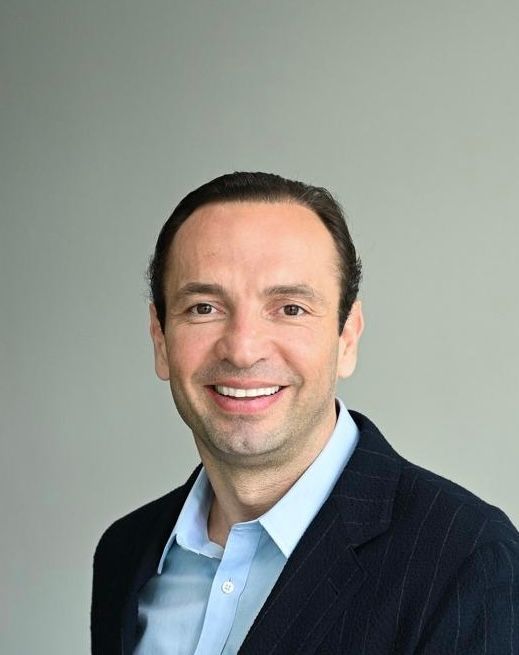 Ned Mahic
Ned Mahic
Executive Chairman & CEO
9606 Capital
Ned Mahic is the co-founder and CEO of 9606 Capital. He began investing in what is now known as industrial outside storage well before the category was formally named, achieving outstanding returns in this emerging market for nearly a decade. With 30 years of experience in real estate management, financing, development, leasing, and investment, Ned has a remarkable ability to identify early investment opportunities. After immigrating to the U.S. in 1994 at age 17, he transformed residential buildings into settlement centers for newcomers, enhancing both cash flow and property value. He also recognized and capitalized on trends in self-storage and student housing, consistently delivering superior returns. As a hands-on entrepreneur and real estate expert, Ned is known for creating value for all stakeholders through his deep property-level knowledge and operational expertise.
1. If you wanted everyone to take away just ONE thing from this inaugural event, what would that one thing be?
The one thing to remember is this: IOS’s true value lies in its ability to serve society. Before it was called IOS, it was already essential. Our operational expertise allows us to unlock its full potential, while our investment expertise ensures we capitalize on that potential. It’s not just about the asset; it’s about what you do with it.
2. What drove you to focus on IOS assets vs. other types of industrial or real estate assets? What do you enjoy about IOS specifically?
We focused on IOS because it's an overlooked asset with real potential. Fragmented ownership creates opportunity. We see value where others don’t. What I enjoy most is transforming these properties into something greater. Our approach creates value not just for investors but also for the sellers. By combining operational expertise with smart investing, we deliver results that benefit everyone involved.
3. For the newbies/IOS-curious, what are the top 3 things you would say are the most important things they need to understand about investing in/owning IOS assets?
- Operational Expertise is Key: Owning land isn’t enough. In IOS, you need to understand operations—logistics, tenant management, and property improvements. It's the management that drives value.
- Resilience Through Scarcity: IOS assets are scarce, and that’s what makes them valuable. With zoning restrictions and growing e-commerce, demand keeps rising. Scarcity protects your investment.
- It’s a Human Interaction: Investing isn’t just about numbers; it’s about people. Understanding sellers’ needs and delivering value to them is crucial. We offer them resources, estate planning, and more. For investors, we bring institutional-grade expertise and results.
4. Can IOS truly be a “growing” asset class when one of the factors that make it so attractive is that supply is, by its very nature, limited? Discuss.
Yes, IOS can be a growing asset class even with limited supply. The scarcity of these assets is what makes them valuable. When something is limited, demand drives up value. Investors look for opportunities where the fundamentals are strong. IOS has those fundamentals—high demand, limited supply, and the ability to generate steady income. The key isn’t how much land there is; it’s what you do with it. As long as there’s demand, there’s growth potential.
5. Given its limited amount of supply, can IOS ever fully institutionalize in the same way other recently emerged industrial assets have? And/or: What does institutionalization look like for these types of assets?
IOS can certainly become institutionalized, but it will look different from other industrial assets. The limited supply makes it a niche market, which is attractive to institutions seeking stability and scarcity. Institutionalization here means consolidating ownership and standardizing operations. It won’t happen overnight, but as more investors recognize the value in these assets, we’ll see a gradual shift toward broader institutional participation. The key is to scale without losing the unique advantages that come from its scarcity.
6. What are you most looking forward to in 2025? (This can be IOS-related, or just something fun!)
In 2025, I’m most interested in the election’s impact on the industrial real estate market. If a protectionist candidate wins, it could drive up the value of U.S. industrial properties. At 9606 Capital, we’re well-positioned for any outcome. We’ve got strong capital reserves and low leverage on our properties, which gives us the flexibility to capitalize on opportunities as they arise. We’re ready for whatever comes next.
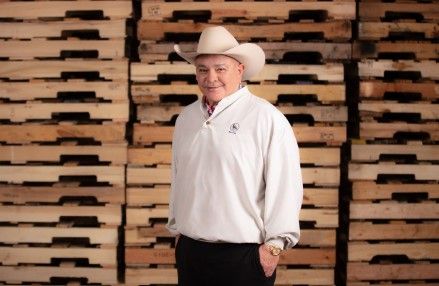 J. D. Salazar
J. D. Salazar
CEO
Champion Realty Advisors, LLC
1. If you wanted everyone to take away just ONE thing from this inaugural event, what would that one thing be?
The value of networking and sharing ides is what this gathering is all about.
2. What drove you to focus on IOS assets vs. other types of industrial or real estate assets? What do you enjoy about IOS specifically?
My wife’s family was in steel and heavy equipment hauling in the Chicago area for 50 years. After they sold the business 20 years ago they kept the real estate. Starting in 1997 I started working parking and outdoor storage as a significant part of my brokerage business. In 2005 we transitioned to investing in all IOS type properties. Early on we had no competitors and were able to buy high single digit Caps in places like Atlanta, DFW and South Fl. I specifically enjoy the people in the business; by and large they were mom and pops many in trucking. Don’t enjoy the institutional types as much.
3. For the newbies/IOS-curious, what are the top 3 things you would say are the most important things they need to understand about investing in/owning IOS assets?
Location is still the number one criteria. You have to have local people managing your properties. Scale matters.
4. Can IOS truly be a “growing” asset class when one of the factors that make it so attractive is that supply is, by its very nature, limited?
Discuss. In general this is a fair statement. There are pockets of opportunity for new development. In the last two years Champion and Timber Hill group have developed 37 acres in SE Dallas TX, 38 acres in Memphis, 10 acres in Ft. Worth and are under construction right now on a 60 acre yard in South Miami
5. Given its limited amount of supply, can IOS ever fully institutionalize in the same way other recently emerged industrial assets have? And/or: What does institutionalization look like for these types of assets? Given the amount of institutional capital that is already migrating into the IOS Sector I can say without hesitation IOS is already institutionalized. Longtime IOS pros like me are now focused on selling assets to this new group of buyers.
6. What are you most looking forward to in 2025? (This can be IOS-related, or just something fun!)
Lower interest rates, Lower CAP rates, a healthy transportation industry and good health for all of us.
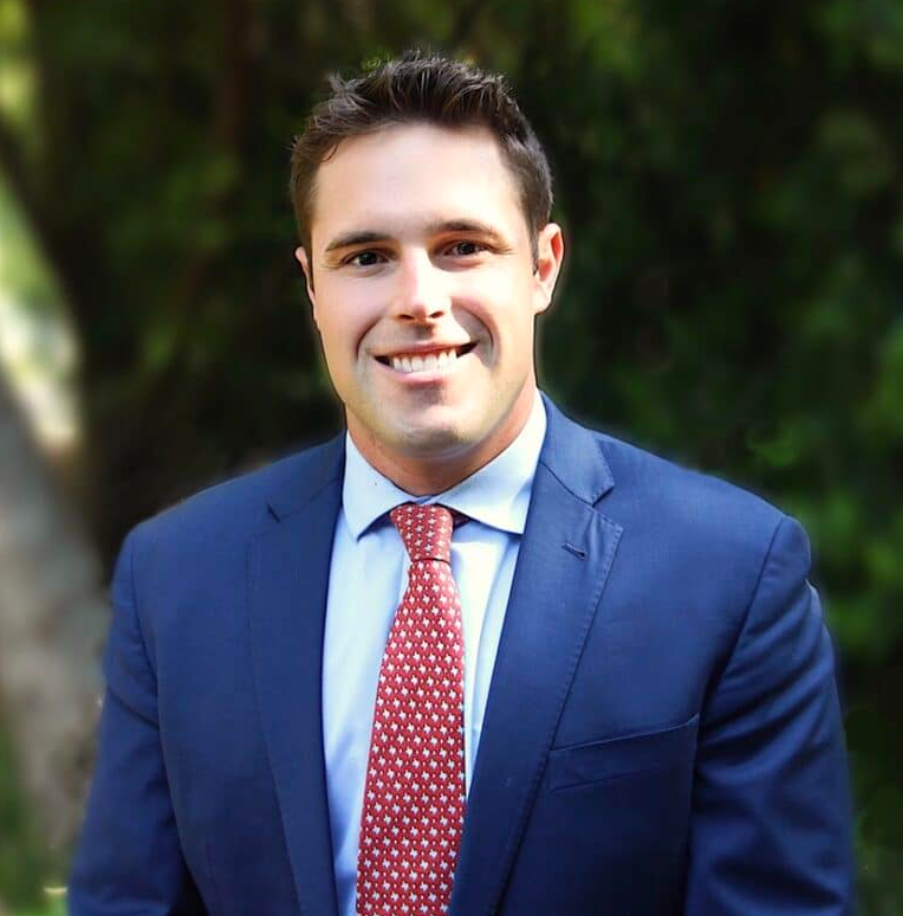 David Guinn
David Guinn
Director of Industrial
Davidson Bogel Real Estate
ABOUT DAVID GUINN, SIOR
David Guinn serves as the Director of Industrial on the Urban Team at Davidson Bogel Real Estate, LLC. He is responsible for the management and organic growth of the industrial team specializing in urban industrial, property leasing, tenant representation, dispositions, acquisitions, covered land, industrial land, 1031 exchange relocation, and sale-leasebacks. David also runs the Industrial Outside Storage (IOS) team at Davidson Bogel which has helped several of the largest investors in the US such as Zenith, Industrial Outdoor Ventures (IOV), Stonemont, and Alterra source over 26 off-market acquisitions since 2021. David is a Graham, Texas native with a background and family ties to farm and ranch sales as well as oil and gas investments. He was a three-year letterman on the Abilene Christian University football team and earned his Bachelor of Business Administration degree in Business Management and a minor in Business Marketing while enrolled there.
David began his career at Stream Realty Partners in 2015 as an analyst and later an Associate on the industrial team with an emphasis on tenant representation and building sales. Later, David took a position as Market Director at Mercer Company with a primary focus on how to master local submarkets and valuing/underwriting industrial investment transactions. Since arriving at Davidson Bogel in June of 2020, through the disposition, acquisition, tenant representation, and leasing. David’s clients have transacted over 2.5 million square feet of industrial buildings and over 400 acres of land with a total aggregate transaction value of over $400,000,000.
David’s passion, faith, hard work, honesty, and dedication to using his local market knowledge and creativity have helped his clients achieve a competitive edge and the best results in all of their real estate needs. David married his wife Maria, a 5th-grade science teacher in Highland Park, in March of 2019 and welcomed their first baby boy George in January 2023 and their second baby boy Charlie in January 2024.
1. If you wanted everyone to take away just ONE thing from this inaugural event, what would that one thing be?
Understanding of the top tenants in this space balance sheet and how much % wise can they realistically pay out of total revenue for a particular site. Hear from owners who have national tenant’s in their portfolio and ask them for specific answers on budgets, and the functionality requirements to attract NATIONAL tenants.
2. What drove you to focus on IOS assets vs. other types of industrial or real estate assets? What do you enjoy about IOS specifically?
It’s a shrinking asset class via supply and demand is growing – also in Dallas, a lot of the brokers focus on big box industrial so we could carve out our nitch and compile all the data before anyone caught up. Also – it’s as it sits today at least in Dallas, these assets primarily owner occupied by a demographic of owners who are typically 60 years + old. Which means over the next 5 years (a lot of groups who sold their company and kept real estate -focus on estate planning etc.) – this inventory is ripe to trade to institutional investors.
3. For the newbies/IOS-curious, what are the top 3 things you would say are the most important things they need to understand about investing in/owning IOS assets?
- Understand the zoning code within the municipality you are buying in first and foremost.
- Understand the infield vs outfield in a given market – movement of goods cost is # cost item for freight & logistics companies – so if you have a site which is in immediate or close proximity to their end consumer – they will pay a lot more. If a site is x miles from their customer and the most expensive item on their balance sheet is fuel, labor (truckers), etc – they will pay a lot less even if the site is zoned/functional.
- Rent Growth is a very real thing – but pay attention to the total size of your site. If a site is 5 acres & the lease rate is $6,000 per acre – that’s a $30,000 a month check that a tenant owes the landlord to operate there (a lot of companies can afford that) – but if your site is 15 acres and it’s $6,000 an acre – that’s $90k a month and there are a handful of companies that can afford it – if those companies don’t want it – then no matter what comps say you will sit.
4. Can IOS truly be a “growing” asset class when one of the factors that make it so attractive is that supply is, by its very nature, limited?
Discuss. A lot of the current ownership of these assets are a demographic of people who are probably 60 years + old. Groups that sold their company and kept real estate, groups who have run trucking/logistics companies for 30+ years, their kids aren’t interested in business etc – will be looking to exit these assets over next 5 years. As the data continues to get stockpiled by institutions making it “safe” for downstream investors to enter the space, - THERE IS A TON OF ROOM FOR GROWTH.
Also adding to this, none of these current developers are really focusing on building these sites “spec”- IOV (3 or 4 last year) – Alterra (1-2) Real Term (Build to Suits) – so if you want a new nitch to add supply – once groups start spec developing them for National Tenant’s the market will grow.
5. Given its limited amount of supply, can IOS ever fully institutionalize in the same way other recently emerged industrial assets have?
And/or: What does institutionalization look like for these types of assets? Look at Self Storage, it’s a $400 bb market, with $50bb REITS focusing exclusively on it – in IOS – it’s about a $200bb market and still growing – as groups like Alterra, Zenith, IOV, Real Term, Triten, etc – continue to build out these portfolios, and set precedent for recaps and dispositions it will just add to the already growing appetite of Sovereign Wealth funds, REITS, the Blackstone’s of the world to scale it.
6. What are you most looking forward to in 2025? (This can be IOS-related, or just something fun!)
Lower interest rates.
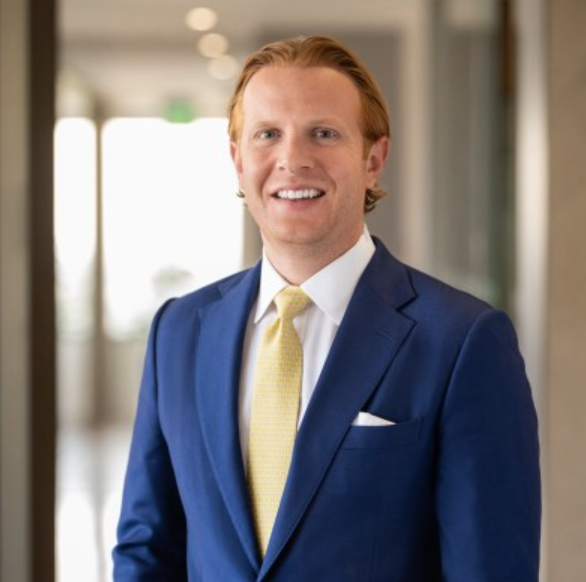 Greg Pearson
Greg Pearson
Managing Director
Fortress Investment Group
Greg Pearson joined Fortress in 2020 to oversee the growth of the fund’s industrial/logistics strategy. He co-leads the US and European business and regularly works with the Japanese team on potential investments. Prior to Fortress, Pearson worked for CenterPoint on the West Coast capital deployment team, focused on port markets. He has extensive experience in the industrial sector, and has transacted in the majority of U.S. and European geographies. Prior to CenterPoint, Greg worked as an Investment Officer for Exeter Property Group and as a Senior Associate for CBRE Capital Markets. He received an MBA from Columbia University and holds a bachelor’s degree from the University of Southern California.
1. If you wanted everyone to take away just ONE thing from this inaugural event, what would that one thing be?
Not all IOS is created equally. There are key ingredients that separate “covered land” and “IOS”.
2. What drove you to focus on IOS assets vs. other types of industrial or real estate assets?
I've been investing in the IOS sector since 2017, when I began studying throughput and supply chain movement. IOS is crucial for managing the first and last mile of the distribution network. As you move towards the center of the supply chain, IOS becomes more of an amenity than a necessity.
3. For the newbies/IOS-curious, what are the top 3 things you would say are the most important things they need to understand about investing in/owning IOS assets?
Zoning, environmental and site efficiency.
4. Can IOS truly be a “growing” asset class when one of the factors that make it so attractive is that supply is, by its very nature, limited? Discuss.
The asset base is well defined in locations that matter and if anything, is shrinking. The asset class is “evolving” as localized information asymmetries are gradually disappearing, and information is gradually institutionalized. For the past 50 years, many tenants have operated globally with localized landlords, creating pricing opportunities. However, the "evolution" of the asset class is disrupting this tenant arbitrage.
5. Given its limited amount of supply, can IOS ever fully institutionalize in the same way other recently emerged industrial assets have? And/or: What does institutionalization look like for these types of assets?
Institutionalization will be driven by the capital markets: both debt and equity. We issued the first IOS SASB in June of 2024, marking a significant milestone for the asset class. This type of execution is paramount for expanding the asset base capital pool and setting a precedent for investment-grade securities. From an equity perspective, it is important more core strategy capital invests in the segment to establish a focus on cash flow, not exclusively residual value. As equity markets continue to dissect the asset class, it will further segment IOS into (i) coastal, tier 1 locations anchored by a port and consumption – high value / rent growth markets AND (ii) locations with an abundance of land and loose zoning controls – commodity assets. Core capital is intrinsically focused on durability of cash flow which is aligned with the former.
6. What are you most looking forward to in 2025?
(This can be IOS-related, or just something fun!) Another big year of production from the West Coast ports
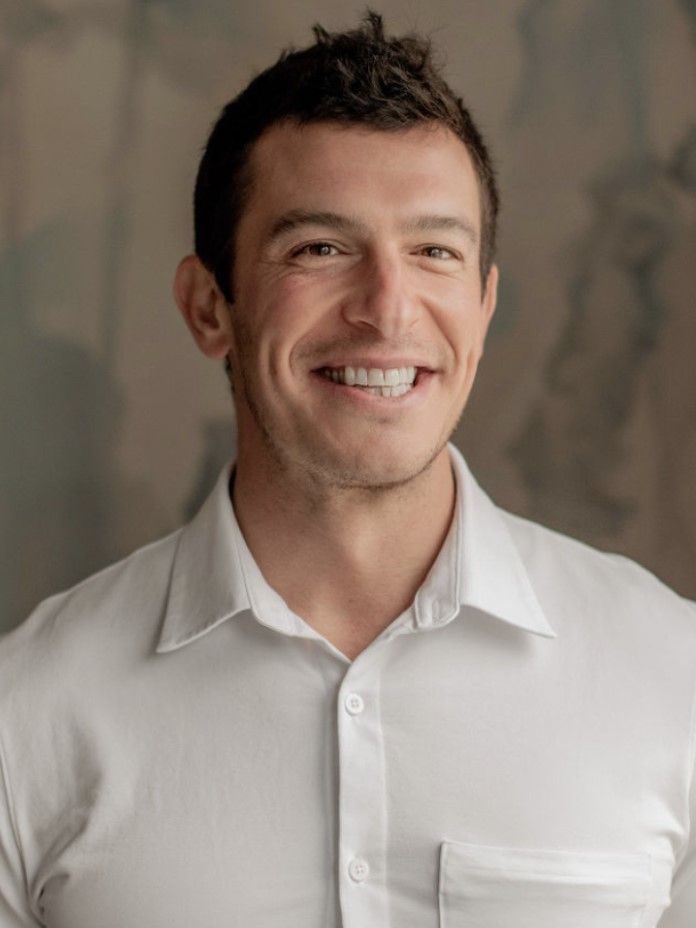 Dan Flamholz
Dan Flamholz
Principal
Greenspring
As co-founder of Greenspring Realty Partners, Dan strives to maintain the balance between creating strong relationships, curating thoughtful investment and development opportunities, and building on his passion for industrial real estate. Dan oversees the firm’s investment, development, leasing, and growth strategies while also playing a roll in the portfolios day-to-day operations. Born and raised in Baltimore, Dan is active in several area non-profits and loves spending time with his wife and chasing around his four young children.
1. If you wanted everyone to take away just ONE thing from this inaugural event, what would that one thing be?
Don’t forget you only buy real estate one time. Your deal is only as good as your basis and you can’t over inflate base rents to offset a bad buy. There are opportunities in this space. Be patient and be ready to strike. Good things come to patient investors who understand the buy.
2. What drove you to focus on IOS assets vs. other types of industrial or real estate assets? What do you enjoy about IOS specifically?
Basic supply and demand. States and Counties have caused outside storage development to become highly difficult and there’s substantial pushback on new IOS development sites. This, combined with heavy industrial properties being rezoned to allow for multi family or mixed use development has caused a tremendous lack of supply in a lot of the primary markets around the country. Heavy industrial used to occupy the majority of the coastal markets but this is now also where people want to live which makes it a tug of war for which use is going to occupy highly valuable real estate. These are typically properties that are in close proximity to major Ports which, again, has created a tremendous lack of industrial supply in already supply constrained markets.
3. For the newbies/IOS-curious, what are the top 3 things you would say are the most important things they need to understand about investing in/owning IOS assets?
Know your zoning, know your environmental, know your market. These are critical items that have tripped up a lot of buyers.
4. Can IOS truly be a “growing” asset class when one of the factors that make it so attractive is that supply is, by its very nature, limited?
Discuss. IOS is still an untapped market. The majority of sellers are still “mom and pops” that own a business and occupy valuable real estate. It’s not an institutionally controlled asset class and therefore, the runway in the space is extensive.
5. Given its limited amount of supply, can IOS ever fully institutionalize in the same way other recently emerged industrial assets have?
And/or: What does institutionalization look like for these types of assets? There is a tremendous amount of IOS/ISF real estate across the country. Because it’s not owned by institutions, it’s not considered an institutionalized asset class but there are phenomenal opportunities and great companies are creating institutional quality portfolios.
6. What are you most looking forward to in 2025? (This can be IOS-related, or just something fun!)
Many IOS investment companies came into the space with extreme aggression and 3.5% debt. Many of those groups are now out of this space due to their inability to recapitalize their capital partners. The market continues to weed out investors that aren’t cautious in the space and don’t understand the risks associated with these deals. 2025 will continue to allow true investors to showcase their ability to close and out position groups that aren’t prepared to transact appropriately.
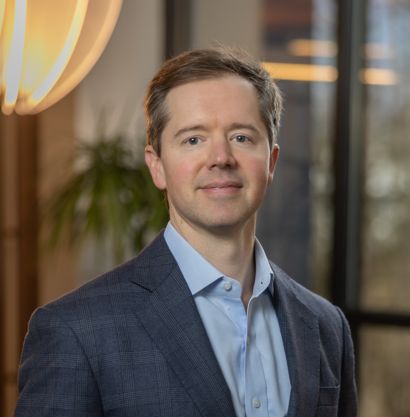 Matt Hunsucker
Matt Hunsucker
Founder
IOS List
Matt Hunsucker is the founder of IOSList, the leading news, data, and transaction platform for industrial outdoor storage professionals. Matt is a veteran real estate principal with over 20 years and $3 billion in transactions across multifamily and industrial assets.
1. If you wanted everyone to take away just ONE thing from this inaugural event, what would that one thing be?
The IOS market will experience incredible growth and consolidation in the next 20 years. Get in front of it.
2. What drove you to focus on IOS assets vs. other types of industrial or real estate assets? What do you enjoy about IOS specifically?
The scarcity of attractive IOS sites creates a great risk-return profile. Also, IOS properties enjoy lower capex and lighter-touch operations (except for managed truck parking).
3. For the newbies/IOS-curious, what are the top 3 things you would say are the most important things they need to understand about investing in/owning IOS assets?
Zoning, zoning, zoning. You must understand the nuances of the zoning code and any required permits for your intended use.
4. Can IOS truly be a “growing” asset class when one of the factors that make it so attractive is that supply is, by its very nature, limited? Discuss.
Good question. The market will find a way to create more supply to fill the need, whether it is remnant space with proper zoning or new IOS development where feasible. Municipalities will need to recognize the value of IOS and encourage solutions to add supply.
5. Given its limited amount of supply, can IOS ever fully institutionalize in the same way other recently emerged industrial assets have? And/or: What does institutionalization look like for these types of assets?
Generally, IOS properties trade at lower prices than vertical industrial developments. Given the price gap, the IOS market may never catch up in nominal dollar terms. but, institutions are rushing into the IOS space and that stampede will continue.
6. What are you most looking forward to in 2025? (This can be IOS-related, or just something fun!)
Lower rates and more transaction volume
 Evan Seiden
Evan Seiden
CEO
Relentless Capital LLC
Based in Miami Florida, Evan Seiden leads Relentless Capital LLC and focuses on identifying real estate opportunities that present a compelling combination of downside protection, and upside potential. Mr. Seiden earned his bachelor’s degree at Cornell University and graduated one year early. As a former manager of real estate investments at Lone Star Funds in New York City from 2008 to 2010, he focused on acquiring large-scale complex commercial real estate transactions involving both debt and equity opportunities. Over the years, Mr. Seiden has taken part in transactions, which collectively have exceeded $1 billion in value.
1. If you wanted everyone to take away just ONE thing from this inaugural event, what would that one thing be?
Pursue your passions fearlessly and focus on improving the experience for your customers, the profits will follow.
2. What drove you to focus on IOS assets vs. other types of industrial or real estate assets?
I felt I could add value improve the day to day experiences of thousands of truck drivers who keep our economy going and I’m very happy I have. What do you enjoy about IOS specifically? It is not overcrowded and still in its infancy allowing me to deploy my creativity and shape the sector.
3. For the newbies/IOS-curious, what are the top 3 things you would say are the most important things they need to understand about investing in/owning IOS assets?
In place zoning day 1, easy access to interstates, Soil density if you plan to pave you must study that in due diligence.
4. Can IOS truly be a “growing” asset class when one of the factors that make it so attractive is that supply is, by its very nature, limited? Discuss.
Yes, it is growing from mom and pop towards private equity deploying an aggregation strategy which will eventually roll into large institutional acquisitions. With a tremendous amount of properties in the hands of a retiring population the opportunities for value add and repositioning to professionally owned and operated facilities will usher in a wave of new investors.
5. Given its limited amount of supply, can IOS ever fully institutionalize in the same way other recently emerged industrial assets have? And/or: What does institutionalization look like for these types of assets?
I believe as a fellow early entrant, I actually own www.IndustrialOutdoorStorage.com so I’ve been thinking about this space for many years now, in professionally run truck parking sites that can function as a logistical hub to meet the needs of truckers and shipping companies alike. Aggregating sites cleaning them up both aesthetically and from a management standpoint will lead to tenants seeking out those filling niches within the sector and adding value to both the end user, truck driver in my case, as well as the corporations who have specific administrative and strategic positioning requirements.
6. What are you most looking forward to in 2025? (This can be IOS-related, or just something fun!)
More time with my two children and rolling out a very unique truck parking platform
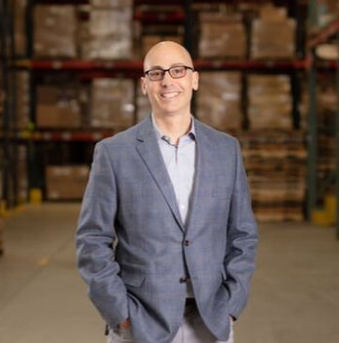 Cary Goldman
Cary Goldman
Group Managing Partner
Timber Hill Group
Cary Goldman, a career industrial real estate specialist, is a managing partner and founder of Timber Hill. He is an expert in the development of sound acquisition strategies and the identification of target acquisitions as well as leasing, tenant relations and disposition strategies. Over the past 25 years, Mr. Goldman has completed industrial real estate transactions valued at more than $1,500,000,000. Prior to forming his new venture in 2018, Mr. Goldman was a managing partner at Sitex Group LLC, a company he co-founded in 2002. There he executed on eight discretionary private equity real estate funds and worked with many of the largest and most innovative companies in the U.S. today. Mr. Goldman also worked with a wide variety of investors such as family offices and high net worth individuals as well as institutional investors including the State Teachers’ Retirement System of Ohio. Under his leadership at Sitex Group, the firm acquired 136 properties valued at more than $1,000,000,000. Mr. Goldman is also the co-owner of Three Ring Studios, a world-class, purpose-built media campus currently being developed in Covington, Georgia. Completion is expected in 2018.
1. If you wanted everyone to take away just ONE thing from this inaugural event, what would that one thing be?
Industrial Outdoor Storage encompasses a variety of asset types, including managed truck parking, traditional IOS, fleet storage, and specialized sites like truck repair depots and equipment storage. Each site can vary in terms of above-ground improvements, surface materials, and overall layout. The key takeaway is understanding which type of storage best suits a specific location based on its unique characteristics and intended use. This knowledge is critical for maximizing value and efficiency in this niche market.
2. What drove you to focus on IOS assets vs. other types of industrial or real estate assets? What do you enjoy about IOS specifically?
Real estate is fundamentally about recognizing trends and maximizing margins. By identifying an emerging niche like IOS and taking calculated risks early in the cycle, you can position yourself for significant rewards. The appeal of IOS assets lies in their growing demand, lower competition, and the opportunity to create value in underutilized spaces. Moreover, the supply of new assets is particularly constrained by increasing NIMBYism among municipalities, which further restricts the availability of new developments.
3. For the newbies/IOS-curious, what are the top 3 things you would say are the most important things they need to understand about investing in/owning IOS assets?
- Grasping entitlements and zoning risks from the outset is essential, as they can significantly impact the viability of an IOS investment.
- The shape and efficiency of the site are crucial; a well-laid-out, irregularly shaped site can often outperform a rectangular one if the latter has poor dimensions that hinder operational flow.
- Is your site located in a market with limited supply and growing demand? How does it compare to the competitive landscape?
5. Given its limited amount of supply, can IOS ever fully institutionalize in the same way other recently emerged industrial assets have? And/or: What does institutionalization look like for these types of assets?
Low supply and growing NIMBYism should keep fundamentals strong in key submarkets across the U.S., leading to cap rate compression that may keep up with Class A industrial properties. The limited availability of IOS assets, combined with high investor demand and minimal capital requirements during the ownership cycle, positions this asset class as highly attractive. These factors suggest that despite the inherent supply constraints, IOS can still be a "growing" asset class to institutional portfolios through value appreciation in prime locations.
6. What are you most looking forward to in 2025? (This can be IOS-related, or just something fun!)
- Interest rate declining.
- The end of the freight recession.
- Artificial Intelligence reaching complete digital consciousness
 Trace Haggard
Trace Haggard
Founder & Owner
TSG Fleet Services
2. What drove you to focus on IOS assets vs. other types of industrial or real estate assets? What do you enjoy about IOS specifically?
I am an owner, user so I’m always looking for opportunities to develop new sites.
3. For the newbies/IOS-curious, what are the top 3 things you would say are the most important things they need to understand about investing in/owning IOS assets?
1. Location/access
2. Zoning/permitting
3. Infrastructure
4. Can IOS truly be a “growing” asset class when one of the factors that make it so attractive is that supply is, by its very nature, limited? Discuss.
It’s more underserved than it is growing.
5. Given its limited amount of supply, can IOS ever fully institutionalize in the same way other recently emerged industrial assets have? And/or: What does institutionalization look like for these types of assets?
I hope not, most institutional assets get over invested and have some kind of major reset.
6. What are you most looking forward to in 2025? (This can be IOS-related, or just something fun!)
The end of the great freight recession.
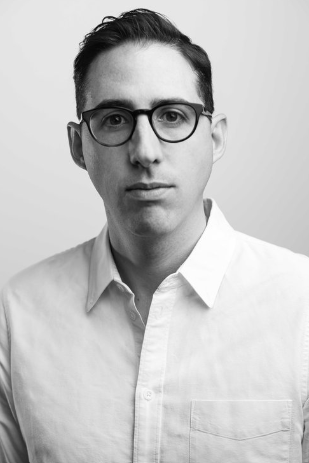 Alex Olshanksy
Alex Olshanksy
Investments
Zenith IOS
If you wanted everyone to take away just ONE thing from this inaugural event, what would that one thing be?
IOS is often “hidden in plain sight” and is a critical component of our nation’s logistics infrastructure. We expect further institutionalization and investment in the space as investors recognize the value of this niche asset class.
What drove you to focus on IOS assets vs. other types of industrial or real estate assets? What do you enjoy about IOS specifically?
We believe that the IOS market is still in its early innings as it relates to widespread adoption and institutionalization. The overwhelming majority of IOS assets are owned by non-institutional owner-users or one-off investors. We believe that IOS is a significant part of the overall industrial market, helping to support and improve the greater industrial supply chain.
For the newbies/IOS-curious, what are the top 3 things you would say are the most important things they need to understand about investing in/owning IOS assets?
1) Market rents can fluctuate widely given micro-location and site quality. 2) Upzoning risks remain a risk factor regardless of current zoning and administrative preferences. 3) Much of the effort in developing an IOS site is in the permitting and approvals, not the work itself.
Can IOS truly be a “growing” asset class when one of the factors that make it so attractive is that supply is, by its very nature, limited? Discuss.
We believe the supply of available IOS assets is generally fixed. However, the increased awareness, financialization, and liquidity surrounding the space will continue to attract institutional investors, allowing the asset class to grow from a value perspective.
Given its limited amount of supply, can IOS ever fully institutionalize in the same way other recently emerged industrial assets have? And/or: What does institutionalization look like for these types of assets?
Yes, we expect IOS to institutionalize much like the Self-Storage asset class. Institutionalization looks like best in class operating practices, increased portfolio ownership and increased liquidity.
What are you most looking forward to in 2025? (This can be IOS-related, or just something fun!)
I am most excited to see my first born son Remy walk! Also excited to deploy capital in our second JV venture with institutional investors advised by JP Morgan Asset Management.
Want to be a part of the ONLY event bringing together the entire IOS community? Register for the forum today.

